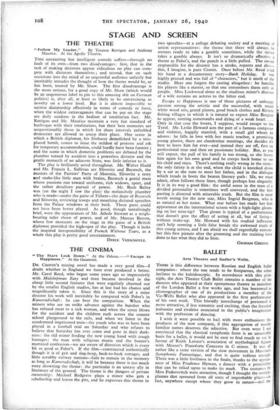STAGE AND SCREEN
THE THEATRE
" Follow My Leader." By Terence Rattigan and Anthony Maurice. At the Apollo Theatre.
THIS unexacting but intelligent comedy suffers—through no fault of its own—from two disadvantages : first, that in the task of making dictators appear ridiculous no play can com- pete with dictators themselves ; and second, that on such occasions into the mind of an ungrateful audience unfairly but inevitably intrudes the thought of how the theme would be, or has been, treated by Mr. Shaw. The first disadvantage is the more serious, for a good copy of Mr. Shaw (which would be an ungenerous label to pin to this amusing skit on German politics) is, after all, at least as likely to be entertaining as novelty on a lower level. But it is almost impossible to satirise dictatorship effectively in terms of comedy or farce, when the wildest extravagances that can be put on the stage are daily outdone in the bedlam of totalitarian fact. Mr. Rattigan and Mr. Maurice maintain a very fair standard of burlesque with their totalitarians, but their best moments are unquestionably those in which for short intervals enfeebled democrats are allowed to usurp their place. One scene in which a British diplomat, his Embassy demolished by a mis- placed bomb, comes to issue the mildest of protests and ask for temporary accommodation, could hardly have been funnier ; and the scene in which domestic problems are debated by the plumber turned by accident into a powerless dictator and the gentle monarch of an adjacent State, was little inferior to it.
The play is brilliantly acted throughout. Mr. Walter Hudd and Mr. Francis L. Sullivan are Slivovitz and Baratsch, the masters of the Patriots' Party of Moronia, Slivovitz a testy and snake-like little man with brains, Baratsch a genial mass whose passions run toward uniforms, rich widows, sport, and the rather desultory pursuit of power. Mr. Bush Bailey was (on the night I saw the play) the melancholy plumber who is made—under the guise of Fiihrer—the dupe of Baratsch and Slivovitz, reviewing troops and mouthing dictated speeches from the Palace windows at their beck. These parts could not have been better played. As good, though tantalisingly brief, were the appearances of Mr. Athole Stewart as a neigh- bouring ruler shorn of power, and of Mr. Marcus Barron, whose few moments on the stage in the guise of a British diplomat provided the high-spot of the play. Though it lacks the inspired irresponsibility of French Without Tears, as a whole this play is pretty good entertainment.
DEREK VERSCHOYLE.






































 Previous page
Previous page